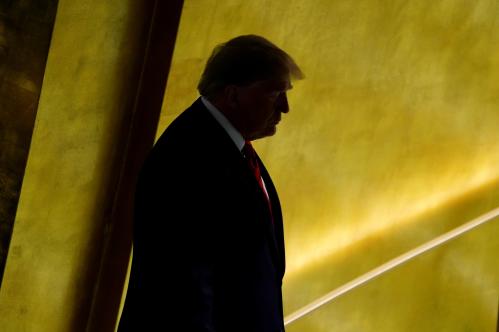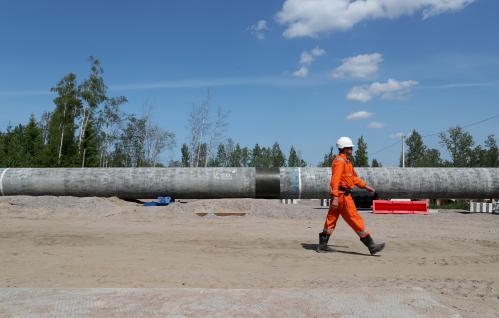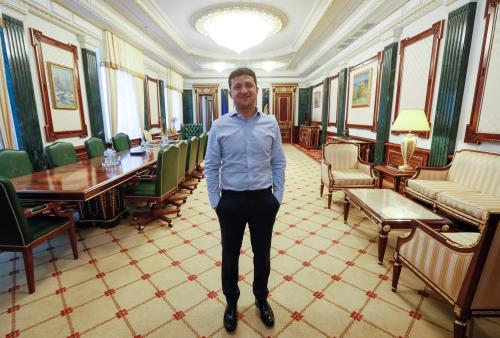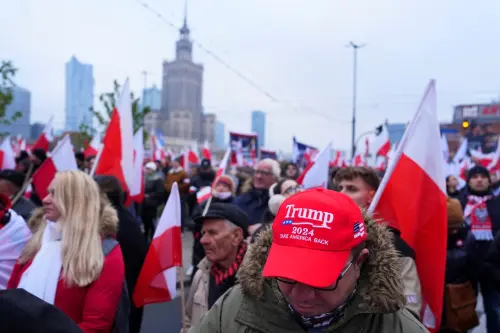The Trump administration apparently has pursued two foreign policy approaches toward Ukraine since at least early 2019. One has sought to advance traditional U.S. national interests. The second has sought to advance prospects for President Donald Trump’s reelection in 2020.
Ukrainian President Volodymyr Zelenskiy and Kyiv should take care, lest their country become a political football in America’s domestic politics. That holds nothing but risk for Ukraine.
The U.S. policy approach
Following the collapse of the Soviet Union in 1991, the George H. W. Bush administration understandably focused its Ukraine policy on the fate of thousands of former Soviet nuclear weapons on Ukraine’s territory. U.S. policy toward the country broadened in 1993. The goals of the Clinton, George W. Bush, and Obama administrations reflected notable consistency in seeking to foster Ukraine’s development as a stable, independent, democratic state with a growing market economy and deepening links to Europe.
There were good reasons for that: Such a Ukraine would contribute to a more peaceful and secure Europe; it could become a partner in tackling key international challenges, such as missile proliferation; and a growing economy would open possibilities for U.S. trade and investment.
Pursuing that policy has sometimes proven challenging. Ukrainian leaders often were slow — or slower than their American counterparts would like — to adopt economic reforms. They hesitated to take serious steps against the corruption that permeated the country. U.S. investors faced daunting problems in growing their businesses in the country.
Ukraine delivered, however, on major issues important to U.S. security interests. Kyiv eliminated 2,000 strategic nuclear warheads deployed to target American cities, along with the missiles and bombers built to deliver them; accepted and applied U.S. guidelines for controlling missile technology; ended its participation in construction of the Bushehr nuclear power plant in Iran; and deployed a sizable contingent of troops to the Iraq coalition force after the 2003 war.
The Trump/Giuliani policy approach
The Trump administration appears to have continued this policy approach, including offering support for Ukraine in the face of ongoing Russian aggression in the Donbas region. But the president does not seem to share his administration’s approach. Instead, Trump and his lawyer, Rudy Giuliani, seem intent on pursuing a different goal: Trump’s reelection in 2020.
Read the memorandum of conversation — whose release Trump approved — of his July 25 telephone call with President Zelenskiy. Trump did not ask for things such as Ukraine’s help in increasing pressure on Iran, which would contribute to a U.S. policy goal. Instead, he asked for a “favor” and put forward two requests for Kyiv: Find out if there was a Ukrainian connection to Crowdstrike (which examined Democratic National Committee servers in 2016), and look into a charge — which has long been repeatedly and thoroughly discredited — that former Vice President Joe Biden sought to hinder an investigation into his son’s activities in Ukraine. Neither of these requests had anything to do with U.S. national interests.
Trump claims there was no quid pro quo, as if his requests to Zelenskiy themselves were not wholly inappropriate. (Any such requests should have come from the Department of Justice or FBI to their Ukrainian counterparts, not from the president.)
The July 25 phone call took place against an interesting background. Trump had intervened to put a hold on $391 million in congressionally-approved military assistance for Ukraine, offering no valid reason for doing so. He had not set a date for a meeting with Zelenskiy, even though an invitation had been extended nearly two months before. One can be forgiven for thinking that the assistance and meeting date might have been held up pending a positive response to the president’s requests for investigations. And it remains unclear what Giuliani, who is not a U.S. official, was telling his Ukrainian interlocutors.
Risks for Zelenskiy and Ukraine
As every Ukrainian president before him, Zelenskiy wants to have — and to be seen as having — a solid relationship with his American counterpart. That is wholly understandable. Signals of U.S. support will strengthen his hand vis-à-vis Russian President Vladimir Putin, whom he may be meeting face-to-face shortly. Those signals also play well with Ukrainian domestic opinion.
However, actually acting on Trump’s — and, presumably, Giuliani’s — requests for investigations into Crowdstrike and the Bidens poses a huge risk for the Ukrainian president and his country. In the 28 years since it regained independence, Ukraine has enjoyed broad bilateral support in Congress. If Zelenskiy allows Ukraine now to become a political football in the 2020 U.S. election campaign, he will endanger that bilateral support.
That is the quandary that Zelenskiy faces.
The best way forward is to politely ignore the investigation requests. If Trump takes any steps to retaliate, Zelenskiy should be able to count on Congress. Congressional Republicans, with a few exceptions, have proven reluctant to call out Trump directly, but they have acted to protect Ukraine’s interests. For example, in 2017 they joined with Democrats to approve — with a veto-proof margin — additional sanctions on Russia that Trump did not want. More recently, Republicans joined with Democrats in questioning the hold on military assistance for Ukraine, which apparently led the president to lift it.
In this regard, the Trump-Zelenskiy meeting unfortunately took place in New York on the margins of the U.N. General Assembly meeting, not in Washington. Zelenskiy thus did not have an opportunity to meet with congressional leadership, both Democrats and Republicans. He should look for an early opportunity to rectify that.
The Brookings Institution is committed to quality, independence, and impact.
We are supported by a diverse array of funders. In line with our values and policies, each Brookings publication represents the sole views of its author(s).








Commentary
The dueling US foreign policy approaches to Ukraine pose a risk for Kyiv
September 30, 2019